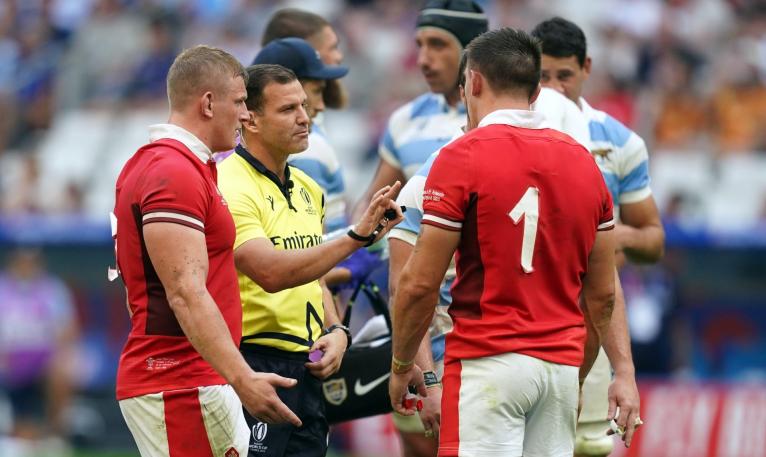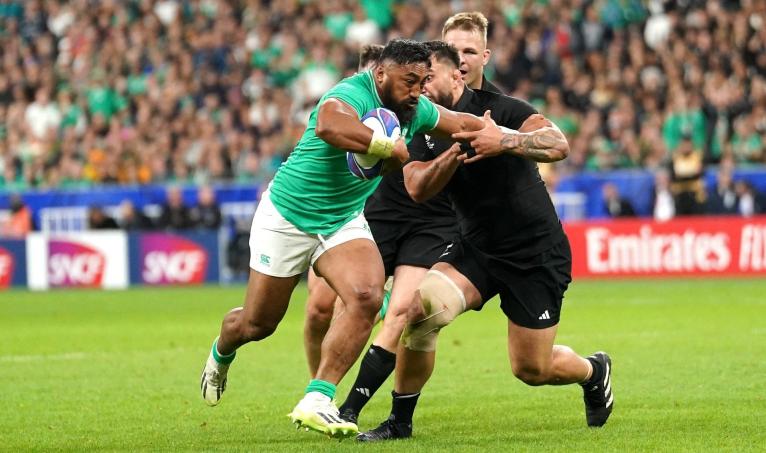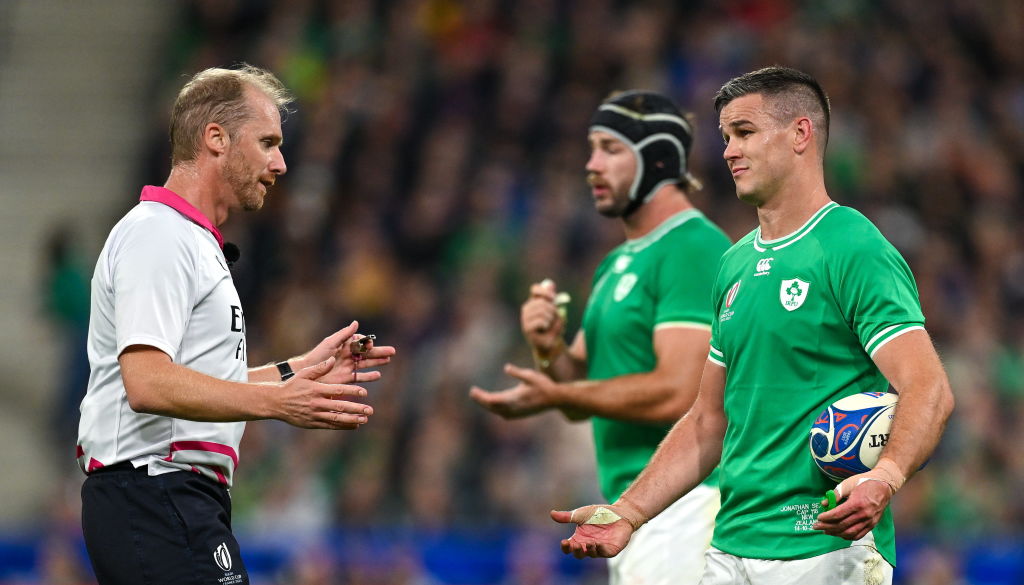Ref Watch: Wayne Barnes in a two horse race

Quarter-final weekend saw Wayne Barnes move into pole position to referee the 2023 World Cup final through a combination of events within and totally beyond his contro
The experienced English whistler delivered yet another superb display under pressure when handling an Ireland v New Zealand quarter-final that may in time come to be seen as one of the great World Cup encounters.
Perhaps the greatest tribute to his decision-making accuracy, superb communication skills and calm management of a contest that was played on the edge from first whistle to last was the absence of social media comment regarding his officiating. An hour after the final whistle I scrolled Twitter and found one comment regarding a possible forward pass…
In truth, aside from England being knocked out between now and then, Barnes needs little help to get appointed to the final since he is head and shoulders ahead of the rest of the refereeing group at the moment.
But the loss of Jaco Peyper – his main rival for the Stade de France gig in a fortnight’s time – to a calf strain 15 minutes into Argentina’s win over Wales certainly does no harm to his prospects.
Should Borthwick’s team pull off what to these English eyes would be little short of a miracle by beating both Fiji then either South Africa or France, New Zealand’s excellent Ben O’Keeffe appears now to be next in line.
What happens next?
When it became apparent that Peyper was unable to continue, I’m sure I wasn’t alone in expecting one of Luke Pearce, Nika Amushakeli or Angus Gardner to appear on the sideline to replace him.
Based on their performances in recent times, all three are higher in my pecking order than any of the four referees appointed as ‘number one’ touch judge in the quarter-finals.
But instead it was Karl Dickson who swapped his flag for a whistle with the reserve official proving to be Australian touch judge Jordan Way.

Having been in Dickson’s situation twice in my career I can vouch for the next 15 minutes being a lot harder than you might expect.
Although you are involved in the game as a touch judge, with the TMO now being the primary foul play support line for the ref, running the line has nothing like the same intensity as being required to make rapid-fire decisions at test match tempo in the middle.
It definitely took me a good period of time to adjust to the sudden switch in mindset required – and you don’t have that luxury on a world stage. To Dickson’s credit he adapted and instantly switched his focus to being in control of this showpiece occasion – and on the whole he did a reasonable job.
Offside in open play
There were two nice pieces of communication from Dickson which explained subtle but different offside calls either side of half-time.
Much to the displeasure of the vocal Argentinian support, Tomas Cubelli was blown for being within ten metres of where Wales gathered a high ball late in the first half. Although he didn’t advance and challenge for the ball, by remaining within a ‘virtual’ ten-metre circumference of the catcher he reduced the options available to Wales and was rightly penalised.
Twenty minutes later Wales took a leaf from the French playbook with a tactic which apparently has been devised with the assistance of 2019 final referee Jerome Garces who now assists les Bleus.
During a long-distance kick exchange their advance towards the catcher started from well in front of the kicker while the ball was in flight. In law a player doing this does not become offside if outside the ten-metre circumference providing he stands still once the ball is claimed until the catcher has run five metres in any direction.
Spotting this Dickson advised: “He’s onside…he’s not within ten.”
Expect a law revision to follow the World Cup…
A shift in emphasis?
Two instances of head contact were reviewed by TMO Marius Jonker.
The first of these on the stroke of half-time saw Wales wing Josh Adams hit Cubelli late and high but without much force. Dickson determined Adams made an attempt to wrap and described it as “a cheap shot” for which he gave Argentina a penalty which they duly turned into three points.
In my opinion Adams can count himself fortunate not to see yellow – especially once the officials have determined he had made a cynical and unnecessary contact.
The second incident early in the fourth quarter saw Pumas lock Guido Petti Pagadizabal strike Nick Tompkins in the face with his shoulder while arriving to clear out. The Welsh centre was already on his way to ground and therefore presented a moving target which – based on his body position – Pagadizabal had no way of seeing.
In commentary, former England lock Ben Kay started by saying “there’s high danger present” before changing his mind after a few replays to ultimately agree with the officials’ decision that no foul play had occurred and it was, in effect, an accidental collision.
I have mixed feelings about this. While Dickson and his team have used common sense and factored the clear lack of intent into judging this ‘a rugby incident’, critics could ask if this is consistent with how similar head contact has been handled throughout the World Cup to date.
This call also had a material impact on the match, since Dickson was playing advantage from an earlier Wales infringement and after he determined the penalty was not being reversed this allowed Argentina to go to the corner and build a series of plays which eventually delivered a try.
As an aside, this sequence of events triggered an increasingly fraught Dan Biggar to scream at the referee with arms flung wide. The ref mic’ picked Dickson up repeatedly telling Wales no.10 to “go away” but subsequent wider-angle footage didn’t make good viewing. As I’ve written often before when passion crosses the line into aggressive dissent it needs dealing with – not least because of the risk of imitation at lower levels – and as a minimum serial offender Biggar should have been given a serious dressing down and final warning.
Barnes the master communicator
Someone may produce footage that proves me wrong, but I simply can’t envisage anyone speaking to Wayne Barnes in that manner.
In a parallel situation during the second quarter-final the veteran English whistler and TMO Tom Foley decided without stopping for a replay that Richie Mo’unga’s second-quarter hit on Bundee Aki was legal.

“No head contact” he advised a clearly disbelieving Johnny Sexton who proceeded to shake his head as hard as his inside centre was rubbing his own!
While Ireland’s skipper made his viewpoint clear through his body language it went no further – probably because Barnes brings so much presence to the role while leaving no room for dispute with his approachable-but-firm manner.
A one-off?
Along similar lines, it occurred to me while watching this absorbing match that Barnes does things his own way – and since he is the best in the sport it set me wondering why no-one copies him?
The answer probably lies in his 100-plus test matches of experience over five World Cups and ‘having the refereeing T-shirt’ from every top match played around the world. If you haven’t got this – combined with a barrister’s communication skills – you probably conclude you can’t carry it off so don’t try.
For example, Barnes is now almost alone in using players’ first names as a regular, normal mode of conversation, and while “Stay in the line Peter” (to O’Mahoney) seems totally natural for him it is difficult to imagine others being comfortable with this approach.
Thanks Tom!
Even the best make mistakes and this all-English officiating team needed help from above to get the right call after Barnes and touch judge Matthew Carley failed to spot that Mack Hansen’s chip ahead was a 50-22. One quick word from Foley later and the correct decision was made.
Similarly, when Barnes in real time viewed Aaron Smith’s one-handed knock-down of an inside ball as “just a penalty for me” Foley quickly stepped in to suggest he looked at a wide camera angle from behind the Kiwi posts.
This clearly showed that Ireland had good attacking options and space when the deliberate knock-on happened and the penalty was immediately and correctly upgraded to a yellow card. Might Foley be joining Barnes at the Stade de France in a fortnight’s time?
Attention to detail
Sometimes it’s the small things that show just how on-the-case a good referee is.
Those keeping stats will have known that we only had one scrum in the first half – but for a ref to have this presence of mind in the cauldron of a match of this intensity was impressive.
“It’s only the second scrum so let’s start again with high binds and nice balance” Barnes reminded the front rows five minutes after the break.
I also enjoyed him advising everyone “there’s no offside line there” when Ardie Savea was tackled and the ball came immediately away – this kind of proactive communication really helps players and those watching.
Ireland’s scrum
In a contest of the finest margins it is interesting to note that Ireland had zero scrum feeds in 80 minutes and that Andrew Porter was penalised on three of the five New Zealand put-ins for the same offence.
He also had the benefit of a lengthy explanation from the referee during a brief spell of downtime prior to a second-half lineout.
Ireland are a brilliant team for many reasons but surely they will reflect on this as a missed opportunity. They may not agree with Barnes (although to my eyes he was 100 per cent correct) that Porter was shifting out then causing a ‘whip-wheel’ by driving across the New Zealand tight head, but they have to adapt to this regardless.
Anorak corner
It was nice to see that Sexton knows the law book as well as Barnes!
When New Zealand’s long-range dropped goal went well wide of the posts the ball came to rest in Ireland’s in-goal area where their skipper touched it down and headed upfield.
As he well knew but plenty of others may not, had that been a kick in open play (ie what law used to call a ‘punt’) a goal-line drop-out follows, but a missed dropped goal sees play restart on the 22.
























































I think Barnes did a decent job controlling the game and letting it flow.
If the Kiwis feel hard done by on certain aspects, I attribute it to the classic “North-South” interpretation divide which should naturally favour the Irish in close, split-second stuff while the All Blacks will seem to struggle - which is exactly what I saw.
To nitpick a bit though, 2 glaring misses -
- At approx 31 min mark, Doris on the lineout won the ball with his outside arm while his inside arm levered on Retallick.
Law 18(29) - “Jumper may catch or deflect the ball with the outside arm only if they have both hands above their head” and “No Levering”- At approx 67min, Jordie is taking a penalty kick at goal and Andrew Porter is walking back and forth 10m in front of the kicker.
Law 8(22) -”the opposing team must stand still with their hands by their sides from the time the kicker starts to approach to kick until the ball is kicked.”(1) is a bit of a nothing burger just that it was glaringly obvious given that the jumpers are in clear sight of everyone front (touchie) and back (Barnes)
But (2) is big though. Jordie missed the kick. He should have gotten a 2nd kick 10m nearer.
I feel ben okeefe cant get the final his mistake cost france the game s.a last pen against france for not releasing was wrong the s.a player had his hand on the ground holding himsef up therefore off his feet pen france and dont get me started on that kolbe blockdown
And they say England wont make the final.
SA are clearly going past the team in the semi. But England will be robbed if Barnes isnt there!
No mention of NZ consistently closing the line on Irish lineouts.
Paul, would love to get your thoughts…
For me, Wayne and BOK are the standout 2 when it comes to selectors. With this in mind.. thee is a 12% chance neither of them can ref the final.
With Jaco injured and presumably out for the cup, what happens?
Raynal was very average.. HOWEVER.. the head of the IRB Refs is a Frenchman and given it’s a home WC can Raynal ref the final?
If not.. we could see Angus Gardner (5th in line) not ref for 3 weeks and gets the biggest game of them all? Or you think it’s easy? Raynal?
Also want to get your thoughts on the failure of the IRB to have quality officials not in actuon this week. Nika, Angus, Luke and others were not ever ARs this week..
Barnes is anti Irish simple, his decisions at scrum down were wrong if your tight 5 pop up under pressure from the opposing side it's a penalty against you as a referee with a 100 plus tests he should know this and he does but his anti Irish bais was glaringly obvious so he stopped Irelands progress through his anti Irish bais.
Thank you for explaining that god awful offside rule, when did that come into the rule book, players infront of a kicker are offside until put onside, none of this wait until the catcher runs five 5m rubbish. If I want to watch league I would, but I don’t want too.
Thought Barnes let the Irish off at quite a few rucks while being harsh on AB's. Faianganuki won the ball while Whitelock got out of the way in plenty of time, that led to the penalty try and yellow card in my opinion, massive call that could have changed the result, that’s not great reffereing to me.
I like Wayne (well - he’s much better since his 2007 meltdown) - but even though he was surprisingly good at scrum time, he over coached the rucks and missed quite a lot there. There were also a lot of forward passes that went unnoticed. His game management is great and his favouring of attack is admirable though. Him and O’Keefe are the best at RWC 2023.
Perhaps it was to the letter of the law, yet I think both yellow cards unnecessary. A hand out, penalty or penalty try. It's instinct. Repeat offence gets yellow. Simple. Same with sacking the mail. Penalty try. Why a card. Consider poor old Dave Poreki. I saw NZ basically drive a maul over the top of him. I suppose he could have remained legal if he had of released his bind? NZ scored. I'm happy enough. Don't need to Oz loose a man as well. Repeat offence of course is yellow. I just don't like unnecessary cards either way. Spoils NZ's victories far to often. Who was that poor old springbok hooker who got to the untouchable Dan that time and went off. Bismarck I believe, and the game turned on ‘that’ fine margin. I prefer to see our boys win fair and square…
Think about that later but my question is. England ball in the semi, ten minutes to go, stuck in the corner. Care feeds the ball into back row. Is this rule just not ref’dthese days?